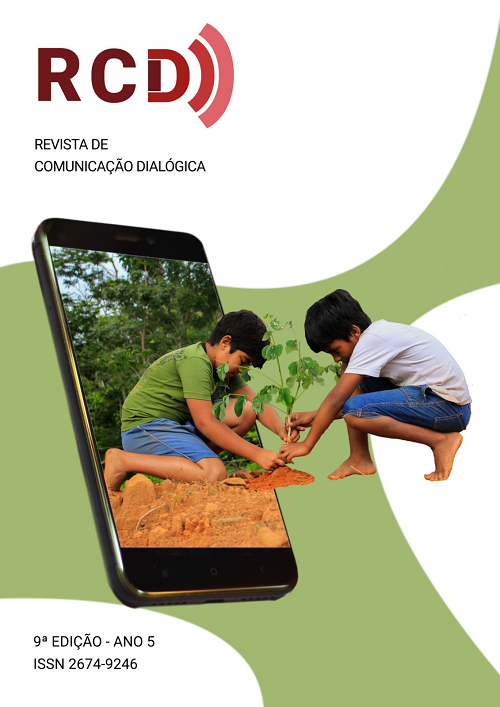EDUCAÇÃO TRANSGRESSORA: PRÁTICAS DO INSTITUTO LIVMUNDI PARA DESPERTAR A CONSCIÊNCIA SOCIOAMBIENTAL
DOI:
https://doi.org/10.12957/rcd.2023.74943Palavras-chave:
Educação, sustentabilidade, comunicação, Instituto LivMundi, socioambiental.Resumo
O artigo discute a necessidade de repensar a educação diante da crise socioambiental e climática. Destaca a importância de uma abordagem educacional transformadora e transgressora, que enfatize a interdependência entre os seres humanos e a natureza, e apresenta o Instituto LivMundi como uma iniciativa que busca promover essa educação crítica e transformadora. O texto aborda práticas realizadas pelo Instituto, como jornadas de aprendizagem, envolvendo educadores e estudantes. Além disso, enfatiza a importância de conectar os jovens com seus territórios de pertencimento e de promover a compreensão cognitiva e empatia emocional em relação à natureza por meio da comunicação, artes e entretenimento. O artigo conclui afirmando que é preciso repensar o modelo educacional atual, de forma a promover uma educação crítica e transformadora, que contribua para enfrentar os desafios socioambientais do presente e do futuro, através de metodologias que privilegiam experiências dos participantes para buscar o bem-estar amplo a partir dos indivíduos.Referências
Brundtland, G. H. (1987). Our common future—Call for action. Environmental Conservation, 14(4), 291-294.
Cope, B., & Kalantzis, M. (Eds.). (2000). Multiliteracies: Literacy learning and the design of social futures. Psychology Press.
Freire, Paulo. Pedagogy of the oppressed. Routledge, 2013
Gidron, N. and Hall, P. A. (2020). Populism as a problem of social integration. Comparative Political Studies, 53, 1027–1059.
IPCC (2018). Global Warming of 1.5°C. An IPCC Special Report on the impacts of global warming of 1.5°C above pre-industrial levels and related global greenhouse gas emission pathways, in the context of strengthening the global response to the threat of climate change, sustainable development, and efforts to eradicate poverty [Masson-Delmotte, V., P. Zhai, H.-O. Pörtner, D. Roberts, J. Skea, P.R. Shukla, A. Pirani, W. Moufouma-Okia, C. Péan, R. Pidcock, S. Connors, J.B.R. Matthews, Y. Chen, X. Zhou, M.I. Gomis, E. Lonnoy, T. Maycock, M. Tignor, and T. Waterfield
Gamson, W. A., Croteau, D., Hoynes, W., & Sasson, T. (1992). Media images and the social construction of reality. Annual review of sociology, 18(1), 373-393
Herman, R. D. K. (2016). Traditional knowledge in a time of crisis: climate change, culture and communication. Sustainability Science, 11(1), 163-176.
Hooks, B. (2013). Ensinando a transgredir: a educação como prática da liberdade. São Paulo: WMF Martins Fontes
Instituto LivMundi. www.livmundi.org. Acesso em mar 2023.
Jocson, K. M. (2015). New media literacies as social action: The centrality of pedagogy in the politics of knowledge production. Curriculum Inquiry, 45(1), 30-51.
Johnston, H., Enrique, L. and Gusfield, J.R. (1994) ‘Identities, grievances, and new social movements’, in Laraña, E., Johnston, H. and Gusfield, J.R. (eds) New social movements: from ideology to identity, Philadelphia: Temple UP
Kessler, E. L. (2021). Climate change concern among youth: Examining the role of civics and institutional trust across 22 countries. Education Policy Analysis Archives, 29(August-December), 124-124.
Klinenberg, E., Araos, M., & Koslov, L. (2020). Sociology and the climate crisis. Annual Review of Sociology, 46, 649-669.
Krenak, A. (2019). Ideias para adiar o fim do mundo (Nova edição). Editora Companhia das Letras.
Lawson, D. F., Stevenson, K. T., Peterson, M. N., Carrier, S. J., L Strnad, R., & Seekamp, E. (2019). Children can foster climate change concern among their parents. Nature Climate Change, 9(6), 458-462.
Lovelock, J. (2016). Gaia: A new look at life on earth. Oxford University Press.
Lübke, C. (2022). Socioeconomic roots of climate change denial and uncertainty among the European population. European Sociological Review, 38(1), 153-168.
Marion Suiseeya, K. R., O’connell, M. G., Leoso, E., Defoe, M. S. B. N., Anderson, A., Bang, M., ... & Zerega, N. (2022). Waking from paralysis: Revitalizing conceptions of climate knowledge and justice for more effective climate action. The ANNALS of the American Academy of Political and Social Science, 700(1), 166-182.
Melluci A. (1996). Challenging Codes: Collective Action in the Information Age. Cambridge: Cambridge Univ. Press
Meirelles R. and Athayde C. (2014). Um País Chamado Favela: A Maior Pesquisa Já Feita Sobre a Favela Brasileira. São Paulo: Editora Gente
Pizmony-Levy, O. (2011). Bridging the global and local in understanding curricula scripts: The case of environmental education. Comparative Education Review, 55(4), 600-633.
Orr, D. W. (2004). Earth in mind: On education, environment, and the human prospect. Island Press.
Raworth, K. (2017). Doughnut economics: seven ways to think like a 21st-century economist. Chelsea Green Publishing.
Saunders, C. (2008). ‘Double-edged swords? Collective Identity and Solidarity in the Environment Movement.’ British Journal of Sociology 59(2): 227–53
Scarano, F (2019) - Regenerantes de Gaia - Dantes Editora
Silva, R. S. D., & Silva, V. R. D. (2011). Política Nacional de Juventude: trajetória e desafios. Caderno CRH, 24(63), 663-678
Snow, D. A., & McAdam, D. (2000). Identity work processes in the context of social movements: Clarifying the identity/movement nexus. Self, identity, and social movements, 13, 41-67.
Shrivastava, Paul, et al. "Transforming sustainability science to generate positive social and environmental change globally." One Earth 2.4 (2020): 329-340.
Taylor, P. (2008). Higher education curricula for human and social development.
Wahl, D. (2016). Designing regenerative cultures. Triarchy Press.
World Commission on Environment and Development, & Brundtland, G. H. (1987). Presentation of the Report of World Commission on Environment and Development to African and International and Non-governmental Organizations... June 7, 1987, Nairobi, Kenya. World Commission on Environment and Development.
Downloads
Publicado
Como Citar
Edição
Seção
Licença
Os Direitos Autorais dos artigos publicados na Revista de Comunicação Dialógica pertencem ao(s) seu(s) respectivo(s) autor(es), com os direitos de primeira publicação cedidos à Revista. Toda vez que um artigo for citado, replicado em repositórios institucionais e/ou páginas pessoais ou profissionais, deve-se apresentar um link para o artigo disponível no site da RCD. A Revista de Comunicação Dialógica está licenciada com uma Licença Creative Commons (by-nc-nd).


